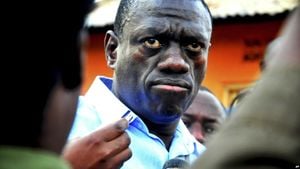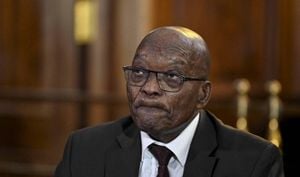The COP29 climate summit is currently being held in Baku, Azerbaijan, where nearly 200 countries are convening to discuss some of the most pressing issues surrounding climate finance. The goal? To broker agreements on how to mobilize up to trillions of dollars to support climate initiatives worldwide. This year’s discussions have been particularly contentious, mired by geopolitical tensions and notable absences of key leaders, raising the stakes for future climate action.
The backdrop of the summit is marked by the looming expiration of the $100 billion commitment made by wealthy nations back in 2009. These nations pledged to contribute this amount annually to aid developing countries in transitioning to clean energy and adapting to climate change impacts, payments which only fully materialized last year. Now, countries are debating the size of future funding goals, hoping to set targets higher than the previous commitments but facing uncertainty as contributions from major economies come under scrutiny.
"Developing nations contend we require over $1 trillion each year to address climate change effectively and safeguard our populations from extreme weather threats. Many have come to Baku with specific figures, with some advocating for up to $1.1 trillion annually," one negotiator noted. The divide remains over how much should arise from wealthier nations versus other sources like private investments or multilateral institutions. Most public funding historically drives the contributions to climate finance, but this approach is being challenged as budgets tighten globally.
Political intricacies have threatened the summit’s focus. Donald Trump's election victory, which has overshadowed discussions, raises concerns about the future of U.S. climate finance. The United States previously contributed nearly $10 billion to international climate finance, but the prospects for funding under Trump appear bleak, impacting any new global target negotiations. This has left many wondering how other donor nations could fill the potential shortfall.
Compounding these issues, geopolitical conflicts have emerged, particularly between the host country, Azerbaijan, and prominent climate advocates such as France. President Ilham Aliyev's remarks praising oil and gas extraction as "a gift from God" have drawn criticism from activists and leaders alike, including notable figures such as Greta Thunberg, who referred to Azerbaijan as "an authoritarian petro-state."
Meanwhile, diplomatic relations between Azerbaijan and France have soured, resulting from longstanding tensions over Azerbaijan’s support for Armenia. France's climate minister has withdrawn from the event amid hostile exchanges between the two governments, demonstrating how diplomatic disputes can disrupt international climate efforts.
The U.K. Prime Minister Keir Starmer’s comments at COP29 also reflected this growing tension, urging the U.S. to maintain its leadership role in climate discussions. He emphasized, "There can be no global security without climate security," pushing for proactive measures to tackle climate change, illustrating the fragile dynamics at play among international leaders.
Developing nations feel particularly stymied by these high-stakes negotiations. Many have adapted reformist lenses as they reassess their historical compliance to UN climate agreements. Argentina, under the leadership of President Javier Milei, has controversially chosen to withdraw its delegation from COP29, citing the need to reevaluate its international climate agreements, including which portions it would support.
This shift not only complicates Argentina's relationship with climate initiatives but could also inspire other nations facing similar pressures to reconsider their commitments.
Despite the backdrop of political discord, it is evident from various discussions and initiatives throughout the summit, there is significant urgency among developing countries to secure enhanced financing. Many look toward rich nations to shoulder most of the financial burden for climate adaptation, yet the historical reality has pointed to the opposite, where vast amounts of climate-related funding flowed primarily toward major economies. Alarmingly, Africa—despite having 54 countries—has received merely 2 percent of global renewable energy investments over the past two decades.
Experts at the meeting assert the intensity of the climate crisis requires immediate and forthright action, characterizing next year’s U.N. deadlines for national climate plans as "a last opportunity" to avert disastrous warming levels. Should COP29 fail to deliver substantial funding agreements, many nations may feel compelled to produce less ambitious climate plans, barring significant implementation capabilities.
Climate change continues to escalate. The average global temperature has risen by approximately 1.3 degrees Celsius largely due to industrial activities, exacerbated by electric emissions from fossil fuels. This has led to catastrophic weather events including devastating floods and extreme heatwaves, as nations scramble to recalibrate their climate goals amid tightening budgets due to economic pressures resulting from COVID-19 and the war in Ukraine, all of which contribute to increasing global inflation levels.
The organized chaos of COP29 paints various narratives filled with hope for progressive actions but grounded substantially by multiple national interests, unresolved tensions, and financial constraints. The world watches as leaders navigate this quagmire, with many hoping the spirit of global cooperation prevails, resulting in productive agreements before the summit concludes.
While COP negotiations have often been characterized as theatrical displays of diplomacy, the stakes appear particularly high this year as finance negotiations and political rivalries could dictate whether we can genuinely tackle the encroaching climate crisis head-on. With nations on different paths and agendas, the question looms: Can the world unite to face climate change before it’s too late?



